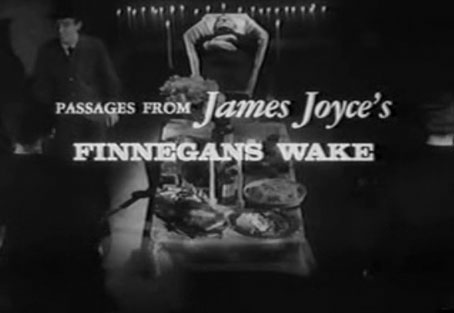
A little obscure literature and film for the morning - from Open Culture. I tried to read Finnegans Wake but failed - may try again one day when I have time to look up all the references I don't know.
"One great part of every human existence is passed in a state which cannot be rendered sensible by use of wide-awake language, cut-and-dry grammar and go-ahead plot". James JoycePassages from James Joyce’s Finnegans Wake: The Film
"Finnegans Wake deals with the nightworld, with the subconscious, and with dreams. Joyce felt that during the night man must redeem himself by means of a quest; must refresh his powers through sleep, which takes him beyond himself into a world without definition. Man's goal is lucidity, a fresh awakening. The quest carries him through all history, which seems to be a constant process of waking. It is some of this universal element which we have tried to capture in this first film based on any of Joyce's major work."
Finnegan - otherwise know as H. C. Earwicker, or Here Comes Everybody - has two sons, Shem and Shaun who are also conflicting parts of himself which invade him; and his daughter Iseult, who is a younger manifestation of his wife, Anna Livia Plurabelle (ALP), who is also his soul and the River Liffey. Finnegan must come to terms with these parts of himself, realize the dangers inherent in their extreme forms, and experience his "reunited selfdom" in order to "Wake" up.
Due to its stylistic and linguistic complexity, James Joyce’s Finnegans Wake ranks among the most difficult works of fiction. And that is why virtually no filmmaker has ever tried to adapt Joyce’s final work for the screen. But after Mary Manning Howe adapted passages from the book for the stage (listen to her reading from Finnegans Wake here), American animator Mary Ellen Bute accepted the challenge and turned Manning’s play into a film.
Sadly, Mary Ellen Bute’s short films are almost forgotten today, but from the 1930s to 1950s her abstract musical shorts were known to a wide audience. Don’t miss her first color film from 1938.
Between 1965 and 1967, Bute created her last film, and only feature film, Passages from Finnegans Wake. The movie was screened at the Cannes Film Festival and named Best Debut of the Year (1965). The video above shows only the opening sequence, but the whole film can be enjoyed online courtesy of UbuWeb.
Bonus: You can read Roger Ebert’s 1968 review of Bute’s film here. He admits that he didn’t enjoy it too much, but concedes this may have been because he hadn’t actually read the book.
By profession, Matthias Rascher teaches English and History at a High School in northern Bavaria, Germany. In his free time he scours the web for good links and posts the best finds on Twitter.
No comments:
Post a Comment